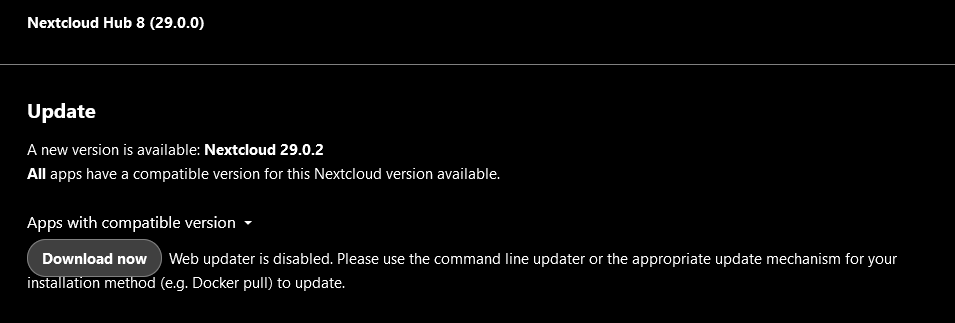Nextcloud version: 29.0.1.1
Operating system and version : Ubuntu 22.04.4 LTS
Apache or nginx version: Apache/2.4.59 (Debian)
PHP version: PHP/8.2.20
Okay, I’m wildly confused. My docker based nextcloud install simply won’t update.
docker compose pull
docker compose up -d
Doesn’t appear to change anything. Even the /usr/src/nextcloud inside the image has the same version 29.0.1.1 instead of the 29.0.2 which is supposed to be the latest. My docker-compose.yaml is almost identical to the example in all important aspects, but I’m obviously missing something.
I’ll replace any instance of my public hostname with publichostname.com
docker-compose.yaml
version: "3"
services:
db:
image: mariadb:10.6
container_name: nextcloud-db
command: --transaction-isolation=READ-COMMITTED --log-bin=binlog --binlog-format=ROW
restart: unless-stopped
volumes:
- db:/var/lib/mysql:z
environment:
- MARIADB_ROOT_PASSWORD=<CENSORED>
- MARIADB_AUTO_UPGRADE=1
- MARIADB_DISABLE_UPGRADE_BACKUP=1
env_file:
db.env
redis:
image: redis:alpine
container_name: nextcloud-redis
restart: unless-stopped
app:
image: nextcloud:apache
container_name: nextcloud-app
restart: unless-stopped
volumes:
- nextcloud:/var/www/html:z
- /mnt/archive/NextCloud:/var/www/html/data
ports:
- 4380:80
environment:
- APACHE_DISABLE_REWRITE_IP=1
- VIRTUAL_HOST=publichostname.com
- NEXTCLOUD_TRUSTED_DOMAINS=nextcloud.publichostname.com
- MYSQL_HOST=db
- REDIS_HOST=redis
- OVERWRITEHOST=nextcloud.publichostname.com
- OVERWRITEPROTOCOL=https
- OVERWRITECLIURL=https://nextcloud.publichostname.com
- PHP_MEMORY_LIMIT=4096M
env_file:
- db.env
extra_hosts:
- "host.docker.internal:host-gateway"
- "mail.publichostname.com:host-gateway"
depends_on:
- db
- redis
networks:
- default
cron:
image: nextcloud:apache
container_name: nextcloud-cron
restart: unless-stopped
volumes:
- nextcloud:/var/www/html:z
- /mnt/archive/NextCloud:/var/www/html/data
entrypoint: /cron.sh
environment:
- PHP_MEMORY_LIMIT=4096M
extra_hosts:
- "host.docker.internal:host-gateway"
- "mail.publichostname.com:host-gateway"
depends_on:
- db
- redis
volumes:
db:
nextcloud:
db.env
MYSQL_PASSWORD=<CENSORED>
MYSQL_DATABASE=nextcloud
MYSQL_USER=nextcloud
/var/www/html/config/config.php
<?php
$CONFIG = array (
'htaccess.RewriteBase' => '/',
'memcache.local' => '\\OC\\Memcache\\APCu',
'apps_paths' =>
array (
0 =>
array (
'path' => '/var/www/html/apps',
'url' => '/apps',
'writable' => false,
),
1 =>
array (
'path' => '/var/www/html/custom_apps',
'url' => '/custom_apps',
'writable' => true,
),
),
'memcache.distributed' => '\\OC\\Memcache\\Redis',
'memcache.locking' => '\\OC\\Memcache\\Redis',
'redis' =>
array (
'host' => 'redis',
'password' => '',
'port' => 6379,
),
'upgrade.disable-web' => true,
'instanceid' => '<CENSORED>',
'passwordsalt' => '<CENSORED>',
'secret' => '<CENSORED>',
'trusted_domains' =>
array (
0 => 'nextcloud.abramearly.com',
),
'datadirectory' => '/var/www/html/data',
'dbtype' => 'mysql',
'version' => '29.0.1.1',
'overwrite.cli.url' => 'https://nextcloud.publichostname.com',
'dbname' => 'nextcloud',
'dbhost' => 'db',
'dbport' => '',
'dbtableprefix' => 'oc_',
'mysql.utf8mb4' => true,
'dbuser' => 'nextcloud',
'dbpassword' => '<CENSORED>',
'installed' => true,
'overwritehost' => 'nextcloud.publichostname.com',
'overwriteprotocol' => 'https',
'loglevel' => 0,
'maintenance' => false,
'mail_from_address' => 'no-reply',
'mail_smtpmode' => 'smtp',
'mail_sendmailmode' => 'smtp',
'mail_domain' => 'publichostname.com',
'mail_smtpport' => '25',
'mail_smtphost' => 'mail.publichostname.com',
'mail_smtpdebug' => true,
'maintenance_window_start' => 1,
'default_phone_region' => 'US',
);
HTTPS is supplied by an nginx server running directly on my local machine that acts as a proxy for multiple subdomains, and forwards any requests to nextcloud.* to the docker container.
Incidentally, I’m also realized that I might have forgotten to return loglevel back to normal after figuring out the smtp server settings.
Any recommendations will be highly appreciated.

